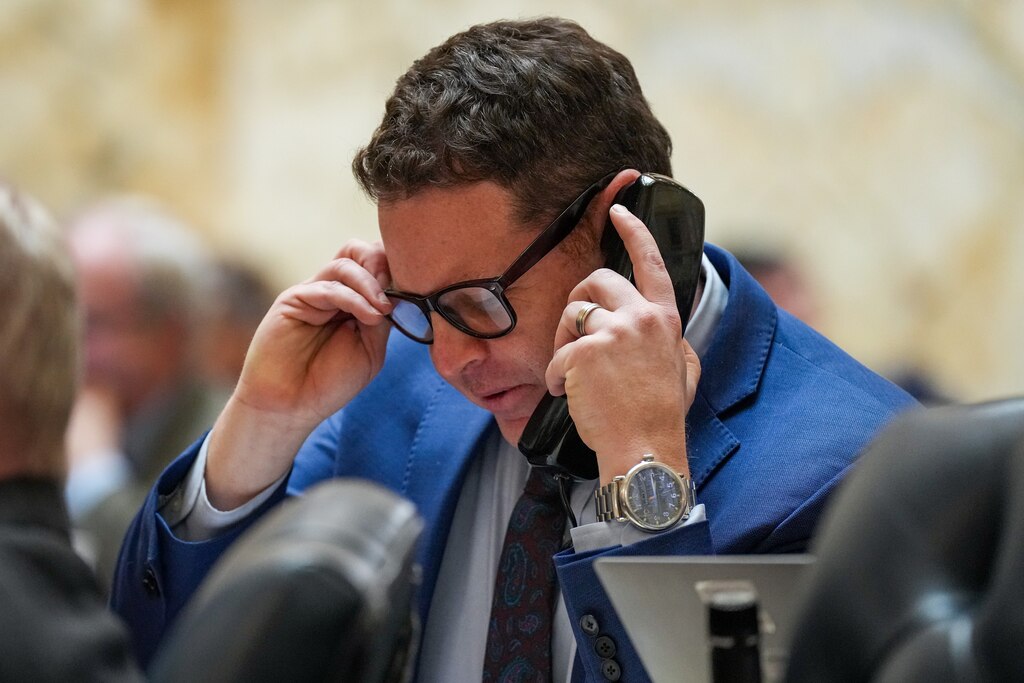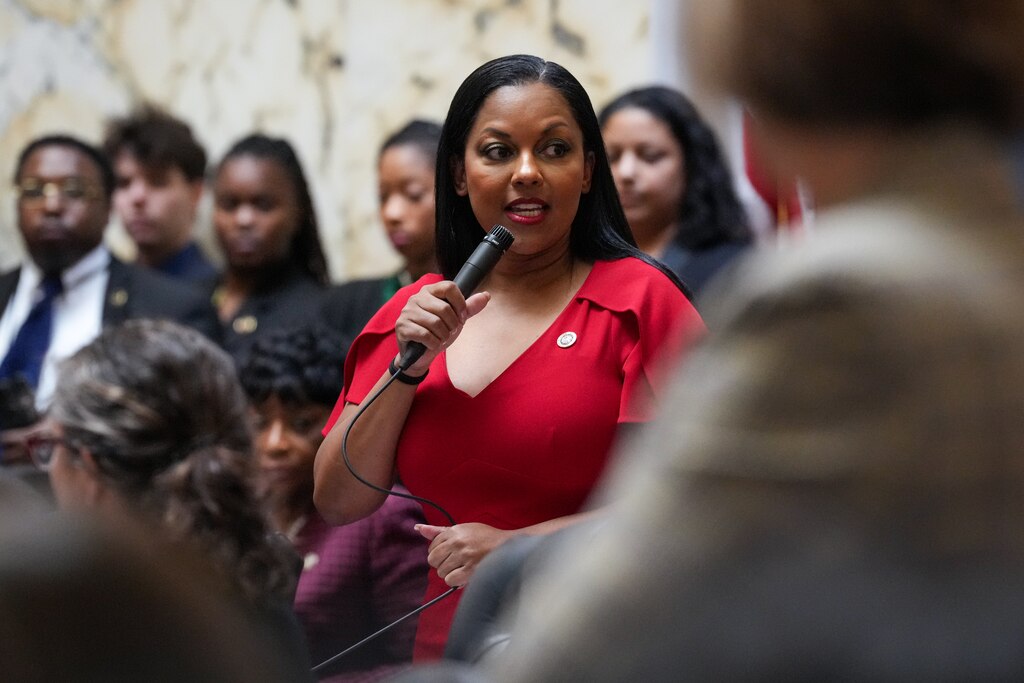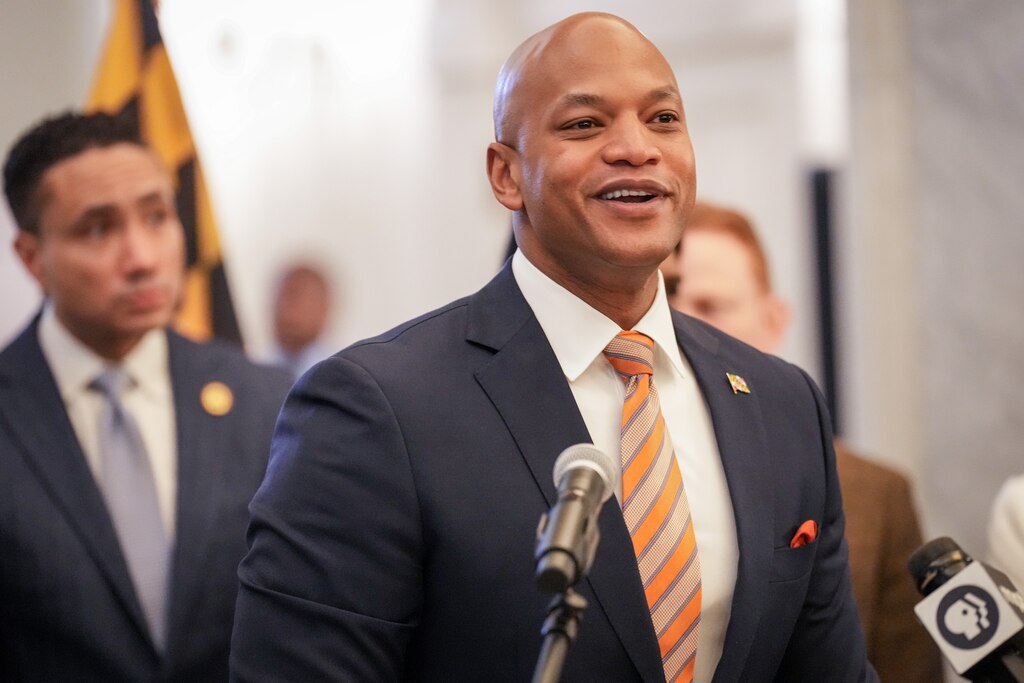As Maryland lawmakers head into the thick of budget decisions, they learned Thursday that they have even less money to work with than expected — and Democratic leaders are not united on how to solve the problem.
Leaders of the House of Delegates and state Senate differ in their willingness to consider tax increases to not only keep the next year’s state government budget in balance, but also to resolve a long-term projected deficit.
“For today, we’re in a good place,” Sen. Guy Guzzone, chair of the Senate’s budgeting committee, told reporters. He recognized, though, that the state has made expensive promises — including to boost public education and improve transportation networks — that have a big price tag in future years.
“We all know about the out-years, right? This is no secret. ... And we know that sort of the bubble on that is a couple years out,” said Guzzone, a Democrat.
Guzzone’s committee plans to put forward a revised version of Gov. Wes Moore’s budget proposal on Friday that does not rely on tax increases to stay in balance. Instead, he said they’ll pull money out of a fund that collects cash when taxes on stock market gains come in higher than anticipated.

His counterparts across the marble hall in the House of Delegates, however, made clear on Thursday that they believe the state has an obligation to make sure it has enough money to fund important programs — and that cuts and short-term maneuvers are not the answer.
“We have shared values,” House Appropriations Committee Chair Del. Ben Barnes said in an interview. “I do believe that we both believe that we need to solve problems, and the House is very clear that we need to solve problems right now.”
One significant driver of the budget picture is the Blueprint for Maryland’s Future, an expensive and ambitious plan to improve public schools. It was passed in 2020 and lawmakers assigned some sources of revenue to pay for it, but not enough to pay for all of the programs when fully implemented in the coming years.
Barnes said that lawmakers don’t want to back down from their promises on education and transportation.
“I think these are things the public can rally around and expects us to find solutions to this year,” said Barnes, a Prince George’s County Democrat. “And I think that’s where the House is going to be.”

Del. Vanessa Atterbeary, who chairs the House committee that reviews taxes, reiterated that position during a briefing Thursday afternoon. She noted that lawmakers always say they pass budgets that are “fiscally responsible and socially prudent.”
“For too long around here, the phrase ‘fiscal responsibility’ has been used to justify taking cuts,” Atterbeary said. “More recently, it has been used not to address a looming issue, seemingly out of fear.”
What’s actually responsible, Atterbeary said, is to make sure there’s enough money to serve people who benefit from government programs, whether it’s state government workers, working families or children in public schools.
“We can either give up on the commitments that we have made — and I will say again, specifically to our children and to our teachers — or we can fix this problem,” said Atterbeary, a Howard County Democrat.
The back-and-forth of remarks by House and Senate leaders on Thursday were calculated and delivered with nuance, but the subtext was clear within State Circle: House leaders are open to raising taxes and Senate leaders are not.
How they got here
Back in January, Moore sent a balanced budget proposal to lawmakers for government spending for the 12-month period starting July 1. The Democratic governor proposed no new taxes or significant ways to raise money, and he has repeatedly said that he has “a very high bar” for any tax increases.
Instead, he closed a budget gap by using money from the Rainy Day Fund and targeted cuts, including to community colleges, private colleges and commissions to lottery agents.
Moore has said the state needs to foster economic growth and abandon the “lazy” reliance primarily on the federal government’s large presence in the state, education and health care. But turning around an economy is a long-term prospect that has yet to pay dividends.

What changed from the time that Moore proposed his budget in January is that state economic experts issued new estimates of the revenues coming into the state on Thursday. The new report predicts about $135 million less for the state to work with for the next budget year, compared to what was in Moore’s proposal.
Due to a variety of factors, officials said, the sources of money coming into the state, such as income tax, aren’t growing quite as much as expected.
The scale of the adjustment is small in the grand scheme of things: the $135 million represents just 0.5% of the state’s general fund, or 0.2% of the overall $63 billion budget. But the new estimates make an already-tight budget that much tighter.
Lawmakers also need to account for an unexpected projected increase in enrollment in the Medicaid insurance program, which is funded jointly by the state and federal governments. That may cost the state more than $100 million each for the current budget year and the next budget year.
David Romans, a nonpartisan analyst who advises state lawmakers, warned that they’ll need to make tough decisions in the weeks ahead.
“You’re definitely going to need to find some additional reduction options or revenues or some combination,” Romans told members of the House’s taxing and appropriations committees on Thursday.
Republican lawmakers, as expected, are not keen on the prospect of raising taxes. House Minority Leader Del. Jason Buckel of Western Maryland warned in a statement that Democrats “seem hell-bent on increasing Marylanders’ tax burden.”
House Minority Whip Del. Jesse Pippy of Frederick County added that instead, “We should be looking at how the state is spending taxpayer dollars, and what changes are needed to grow the economy.”
Tax and fee proposals on the table
A variety of tax and fee proposals have been floated in this General Assembly session. None is yet to advance, though House leaders appear to be giving them more consideration.
Barnes, for example, has proposed raising the alcohol tax from 9% to 10% as well as increasing tobacco taxes.
There’s also a proposal from a group called the Fair Funding Coalition that would change corporate taxes in a way that proponents say would close “loopholes,” as well as raise taxes on the highest-income earners. The proposal would bring in an estimated $1.7 billion per year.
And on Monday, delegates will hear a proposal to drop the sales tax from 6% to 5% while also expanding it to an array of services not currently taxed, such as landscaping, auto repair, child care, accounting and legal services. Business groups and Republicans are already lining up against it.
A similar proposal was considered — and rejected — in 2020. At that time, it was predicted to bring in up to $2.9 billion per year. That would be enough to solve most of Maryland’s forecasted long-term budget shortfall in one fell swoop.
Where there is some level of agreement among Democratic leaders is the need to raise money for the state’s long-term transportation budget, which is facing cuts to construction projects and transit service if unaddressed. The gas tax, in particular, isn’t bringing in enough money that’s needed to pay for transportation projects.
Solutions under consideration include increasing the registration fees for electric vehicles that don’t pay gas taxes, raising tolls on out-of-state drivers, charging a fee on rides through services like Uber and Lyft or adding a fee on package delivery.
“All of these ideas are being done elsewhere to help fund infrastructure,” said Del. Marc Korman, chair of the House’s transportation committee. “We just need to figure out the right puzzle to fund what we want to fund in Maryland.”
Baltimore Banner reporter Brenda Wintrode contributed to this article.




Comments
Welcome to The Banner's subscriber-only commenting community. Please review our community guidelines.